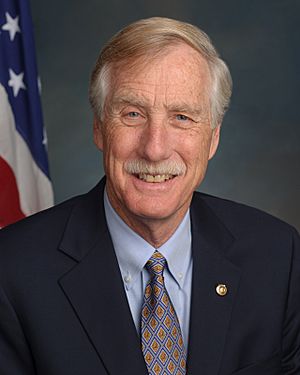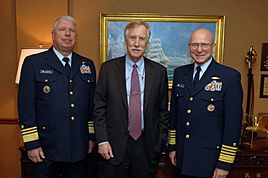Angus King facts for kids
Quick facts for kids
Angus King
|
|
|---|---|

Official portrait, 2013
|
|
| United States Senator from Maine |
|
| Assumed office January 3, 2013 Serving with Susan Collins
|
|
| Preceded by | Olympia Snowe |
| 72nd Governor of Maine | |
| In office January 5, 1995 – January 8, 2003 |
|
| Preceded by | John R. McKernan Jr. |
| Succeeded by | John Baldacci |
| Personal details | |
| Born |
Angus Stanley King Jr.
March 31, 1944 Alexandria, Virginia, U.S. |
| Political party | Independent (since 1993) |
| Other political affiliations |
No Labels (since 2013) Democratic (before 1993) |
| Spouses |
Edith Hazard
(div. 1982)Mary Herman
(m. 1984) |
| Children | 5, including Angus III |
| Education | Dartmouth College (BA) University of Virginia (JD) |
| Signature |  |
| Website | |
Angus Stanley King Jr. (born March 31, 1944) is an American lawyer and politician. Since 2013, he has been a United States senator from Maine. A senator is a person elected to help make laws for the whole country. King is a political independent, which means he does not belong to the Republican or Democratic parties.
Before becoming a senator, King was the 72nd governor of Maine from 1995 to 2003. A governor is the leader of a state's government.
King won the 2012 Senate election to replace Olympia Snowe, who was retiring. He was reelected in 2018 and again in 2024. Although he is an independent, he works with the Democratic Party on committees in the Senate. This is called caucusing. He is one of two independent senators who caucus with the Democrats. The other is Bernie Sanders of Vermont.
Contents
Early Life and Career
Angus King was born in Alexandria, Virginia. His father was also a lawyer. After high school, King went to Dartmouth College and then to the University of Virginia School of Law.
After law school, he moved to Maine and worked as a lawyer. In the 1970s, he worked as an assistant to U.S. Senator William Hathaway. He also became well-known in Maine as a host on public television.
When he was 29, King was diagnosed with a serious form of skin cancer called melanoma. He has said that he survived because he had health insurance. This experience has influenced his support for laws that help people get healthcare.
In 1989, King started a company called Northeast Energy Management, which worked on projects to save electricity. He sold the company in 1994 before running for governor.
Governor of Maine (1995–2003)
In 1993, King decided to run for governor of Maine as an independent. He had been a Democrat his whole life but chose to run without a party. He won the election in 1994 in a close race.
As governor, King was popular. He was the only governor in the U.S. at the time who was not part of a political party. In 1998, he was reelected by a large margin, winning 59% of the vote.
One of his most famous projects was the Maine Learning Technology Initiative (MLTI). This program gave laptop computers to every middle school student in Maine's public schools. It was the first program of its kind in the country.
Break from Politics (2003–2012)
After his time as governor ended in 2003, King and his family took a six-month road trip across the United States in a motor home. They traveled 15,000 miles and visited 33 states.
Later, he taught politics at Bowdoin College and Bates College in Maine. He also started a wind energy company, but he sold his part of the business when he decided to run for the U.S. Senate.
U.S. Senate (2013–Present)

Elections
In 2012, King ran for the U.S. Senate and won with 53% of the vote. He was reelected in 2018 and 2024. He chose to caucus with the Democrats, which allowed him to get positions on important Senate committees.
Important Work in the Senate
King has worked on many issues in the Senate. He supported changes to the filibuster, a Senate rule that can be used to delay votes. He also worked to protect programs that help people buy food.
In 2021, King was in the U.S. Capitol during the January 6 attack. He called the event a "violent insurrection" and blamed former President Donald Trump for it.
King has also been involved in foreign policy. He has been critical of Israel's actions in the Gaza war and voted to block some arms sales to the country.
Committee Work
Senators do a lot of their work in small groups called committees. King's current committee assignments include:
- Committee on Armed Services (which deals with the military)
- Committee on Energy and Natural Resources
- Select Committee on Intelligence
What King Believes (Political Positions)
King is known as a moderate, meaning his views are often in the middle. He works with both Democrats and Republicans. He has called himself "neither a Democrat nor a Republican, but an American."
Environment and Energy
King believes that climate change is a serious problem. He carries a chart showing the increase in carbon dioxide in the air to show to people who doubt climate change. In 2016, he went on a trip to Greenland with the U.S. Coast Guard to see the melting ice for himself. He opposes drilling for oil in the Arctic National Wildlife Refuge.
Healthcare
Because of his own experience with cancer, King is a strong supporter of the Patient Protection and Affordable Care Act (also known as Obamacare). He believes everyone should have access to health insurance. He also supports a woman's right to choose and programs that provide healthcare to children and low-income families.
Gun Laws
King supports expanding background checks for people buying guns. He also supports limiting the size of ammunition magazines. However, he does not support a ban on so-called "assault weapons," saying that such a ban would not be effective.
Social Media
In 2025, King co-sponsored the Kids Off Social Media Act (KOSMA). This bill would set a minimum age of 13 for using social media. It would also stop social media companies from showing algorithm-based content to users under 17.
Personal Life
King has been married to his wife, Mary Herman, since 1984. He has five children and six grandchildren. He is an Episcopalian and enjoys riding his Harley-Davidson motorcycle.
In 2021, King tested positive for COVID-19. He said he was glad he had been vaccinated, as he believed it made his illness less severe.
Images for kids
-
Martin Dempsey (right), speaks with King (left) at a Senate Armed Services Committee meeting in 2014.
See also
 In Spanish: Angus King para niños
In Spanish: Angus King para niños
 | Kyle Baker |
 | Joseph Yoakum |
 | Laura Wheeler Waring |
 | Henry Ossawa Tanner |



